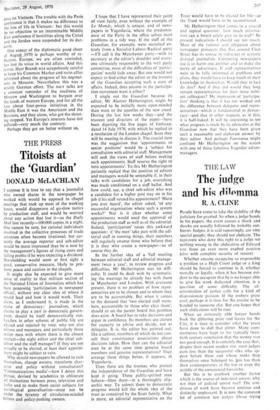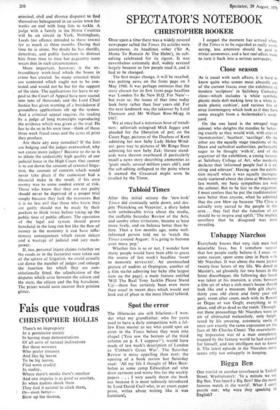THE LAW
The judge and his dilemma
R. A. CLINE People have come to take the stability of the judiciary for granted. So when a judge hands in his papers, the event causes a shock and shocks are usually followed by irritable out- bursts. Judges, it is said reprovingly, are very special people; they should not abdicate. The reprovers who deny this right to a judge see nothing wrong in the abdication of Edward Inn from an even more exalted position (also with complete security of tenure).
Whether anyone occupying so responsible a position as a High Court judge or a king should be forced to continue in it, whether morally or legally, when it has become evi- dent to the occupant that he is no longer able to give his work dedicated attention, is a question of some difficulty. The ad- ministration of justice calls for a kind of dispassionate passion. If the embers grow cool, perhaps it is time for the ermine to be handed to someone else. But one hopes that such abdications will be rare.
When an extremely able lawyer hands back the glittering prize and leaves for the City, it is time to consider what the years have done to dull that glitter. Many com- mentators have leapt to the typically twen- tieth century conclusion that the money was not good enough. It is certainly the case that, despite their recent modest rise, most judges earn less than the successful silks who ap- pear before them and whose ranks they themselves once belonged to. Less too than their contemporaries at the top or even the middle of the commercial hierarchy.
But this is to overlook another factor which is the source of industrial unrest; why not then of judicial unrest too? The con- ditions of work have become onerous and distinctly unpleasant. It is now The common lot of common law /judges (those trying
criminal, cilia and divorce disputes) to find themselves beleaguered in an assize town for weeks on end with long lists to tackle. A judge with a family in the Home Counties will be on circuit in York, Nottingham, Leeds (no offence intended to those towns) for as much as three months. During that time he is alone. No doubt he has sheriffs, detectives, and public functions to distract him from time to time but pageantry soon wears thin in such circumstances.
More important, however; is the ex- traordinary work-load which the boom in crime has created. So many criminal trials are contested which ought not to be con- tested and would not be but for the support of the state. The applications for leave to ap- peal to the Court of Appeal have now soared into tens of thousands and the Lord Chief Justice has given warning of a breakdown if groundless applications silt up the system. And a criminal appeal requires the reading by a judge of long transcripts reproducing the evidence which was givtn at the trial. He has to do so in his own time—think of those three week fraud cases and the acres of print they produce.
Are there any easy remedies? If the lists are bulging and the judges overworked, why not create more judges? Because to do so is to dilute the undeniably high quality of our judicial force in the High Court. One answer is to cut down the amount of criminal litiga- tion, the amount of contests which would never take place if the contestant had a financial stake in the result, if his own money was to some modest extent at risk. Those who know that they are not guilty should never be deprived of a proper trial simply because they lack the resources. But it is no less evil that those who know they are guilty should not be made by their pockets to think twice before taking up the public time of public officers. The operation of the legal aid system should prove beneficial in the long run but like the flow of money in the economy it can have infla- tionary consequences which create delays and a wastage of judicial and jury man- power.
If, too, personal injury claims (whether on the roads or in the factories) were taken out of the sphere of litigation, we could actually cut down the number of judges and enlarge.
the function for which they are con- stitutionally fitted, the adjudication of the disputes which arise between the citizen and the state, the citizen and the big battalions. Thc prizes would soon recover their pristine glitter.































 Previous page
Previous page